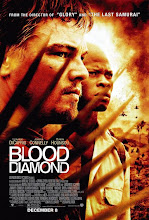"In America its bling bling but out here its bling bang!"
-Blood Diamond (the movie)
To study how much of an impact celebrities have had on making substantive changes on the issue of Conflict Diamonds, I think it is important to consider the timeline of events. In 2000, the UN passed the resolution on Conflict Diamonds six years before Hollywood entered the dialogue with the release of the film Blood Diamond. If one is to assume that a UN Resolution is the measure of whether an issue has made it to the global agenda then the issue of Conflict Diamonds made it on the agenda well before celebrities advocated on the behalf of its victims. The role celebrities and Hollywood play on the issue of Conflict Diamonds was to bring the issue to a larger audience, and to remember the victims of the conflicts. Celebrities also have sparked dialogue- between each other, with states, and with the diamond industry. The rest of this blog will present the debates that emerged around the issue after the 2000 UN resolution.
On December 15, 2006, Warner Brothers released the film Blood Diamonds directed by Edward Zwick. The film takes place during the Sierra Leone Civil War of 1999. It tells the story of a Western journalist, Rhodesian diamond smuggler, and an African fisherman in search of his son, who was kidnapped by the rebel forces. The film exposes the diamond industry’s exploitation of the African mineral. The film also caught attention because Leonardo DiCaprio played the main character. Amnesty International and Global Witness also sponsored this film.
In my research, I have found that Leonardo DiCaprio was not as outspoken about the issue of Conflict Diamonds as I had thought. In interviews he steered away from passing judgment on the industry today, this is exemplified in one of his responses to an Entertainment Weekly interview:
The reporter asked: “Did making this movie change your opinion about diamonds?”
He responded:”[Deep breath] Well, without getting into the whole political aspect, because I think the movie should speak for that, to me diamonds represent any sort of natural resource that we get from foreign countries and how that affects the economy and the politics and the conditions of those people.”
Also, in tracking DiCaprio’s involvement with charities on http://www.looktothestars.org/, I found he is not affiliated with any group with a clear connection to the issue of Conflict Diamonds.
Other celebrities have been more outspoken about this issue than DiCaprio has been. According the Los Angeles Times, the director, Edward Zwick, faced a lot of pressure from the diamond industry to make clear in the publicity of the film that this was no longer a problem because The Kimberely Process has been 99% effective. Zwick refused. The industry then “began its multimillion-dollar campaign to ‘educate consumers’ about the Kimberley Process.
After the movie, Zwick was asked to speak at the 2007 International Diamond Conference in New York. His speech called the diamond industry to take responsibility of the people they exploit.
The reaction that the film received was both surprising and predictable. The Diamond Industry obviously lobbied against exposing its inconsistencies with The Kimberely Process, but more surprisingly was that notably celebrities spoke in favor of the diamond industries attempts to help Africans. Russell Simmons, a famous rapper, started an organization called Diamond Empowerment Fund or D.E.F. Before the movie came out, Simmons went on a fact finding mission (sponsored by the diamond industry) to see how the diamond industry is helping Africans out of poverty. Zwick criticized Simmons, but in an article on africaResource Simmons defends his position:
"But to suggest I'm a sellout is wrong. I'm not here to defend the past of these companies. I'm here to talk about the current reality. Diamonds pay for education and medical treatment in Africa."
Simmons organization is also the only charity that comes up on http://www.looktothestars.org/. Celebrities who are related to this charity are Beyonce, Nelson Mandela, and Naomi Campbell. It was also recently reported that Gisele Bundchen will be donating “a personal collection of dazzling bling in a special auction at Christie’s New York next month.”
In addition to Simmons activism on the issue, other rappers have decided to be vocal on the issue. Nas released a video for the movie, Blood Diamonds. Kanye West also released a song entitled “Diamonds from Sierra Leone.”
Kanye was also featured in a VH1 special on Conflict Diamonds that came out around the same time of the movie. Bling: A Planet Rock, discusses the irony of how diamonds empower the urban black rappers that came from little, while at the same time disenfranchising black people in Africa.
The 2006 movie, Blood Diamond, expanded the debate on Conflict Diamonds, whether it brought significant change still cannot be determined. My research could not find any conclusive evidence that substantial research had been done on the movie’s impact on the issue.



No comments:
Post a Comment